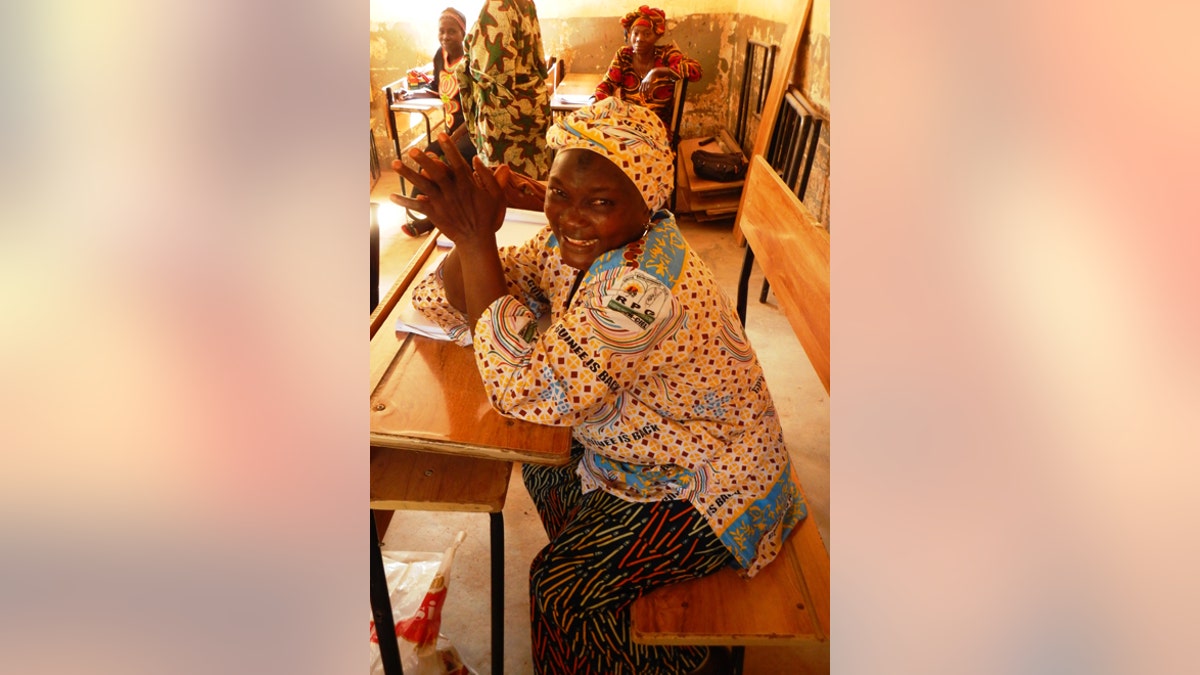
A class of midwives and cleaners in Macenta, Guinea receiving Ebola health care training. (Lindsey Horton)
I recently returned from West Africa to see the fight against Ebola again first-hand.
There’s been progress, but so much still needs to be done.
In Conakry, Guinea there’s been an increase in new Ebola cases and an increasing risk of large city-wide outbreak.
Sierra Leone has only recently mounted effective programs to address a rapidly rising case count.
In my travels, I met so many health care workers, selfless public health heroes working side-by-side to fight the virus. And I met survivors, still reeling from loss of family members, whose stories fill us all with hope.
In Liberia the number of sick people is decreasing, but we have to guard against complacency, which would fuel a resurgence.
In my travels, I met so many health care workers, selfless public health heroes working side-by-side to fight the virus. And I met survivors, still reeling from loss of family members, whose stories fill us all with hope.
In all three countries, the hard work of promptly finding, isolating and caring for all people who develop Ebola, and identifying and monitoring all contacts still has to improve greatly in order to get to zero cases.
In my travels, I met so many health care workers, selfless public health heroes working side-by-side to fight the virus. And I met survivors, still reeling from loss of family members, whose stories fill us all with hope.
And I met with CDC staff who, with their colleagues, have been working around the clock to contain the epidemic.
Since March, CDC staff have worked here at home and in West Africa to protect the lives of Americans and people across the globe. The commitment of all of these workers, and those who have endured to help others, humbles and inspires me. Like many Americans, I am deeply grateful for their service and their sacrifice.
While some things CDC does gets lots of attention, most of what we do is behind the scenes.
Our professional team has processed more than 10,000 lab specimens in West Africa; issued more than a hundred rigorous guidance documents covering virtually everything from how to clean and disinfect airplanes to talking with your children about Ebola; initiated Ebola vaccine trials and worked to develop new diagnostic tests that can shorten the time it takes to make a diagnosis; and created communication tools to educate and inform the people of West Africa of the threat and how to protect themselves and their families.
Here at home we’ve worked with state and local public health systems to develop procedures to monitor all those coming to the United States from the affected countries and created a screening system being used in all American airports that receive passengers from the affected countries. As someone who just went through that process, I am impressed by the professionalism, efficiency, and coordination among CDC, Customs and Border Protection, and state and local health departments to both monitor and support returning travelers.
CDC experts can jump on a plane at a moment’s notice to help a hospital deal with a suspected or confirmed case of Ebola. Other CDC teams have been working with hospitals across the country to assess and strengthen their preparations for any possible patient with Ebola who might come through their doors.
We’ve also broadened US laboratory capacity to test for Ebola so that diagnosis is quicker, and along with our partners have trained more than 10,000 domestic health care workers to prepare for a possible Ebola patient.
The American health care system is now better prepared for an infectious disease threat than it was just a year ago, but there is still more we need to do.
The President’s Emergency Funding Request recently passed by Congress provides CDC funds for domestic and international work to protect America’s security and the world from infectious disease threats by strengthening the global community’s ability to do three key things.
- Prevent avoidable catastrophes and epidemics wherever possible.
- Detect threats early, with real-time disease tracking, effective diagnostics, and the ability to identify and collect outbreak specimens and safely and securely transport them to accredited laboratories.
- Respond rapidly and effectively.
The Emergency Funding Request also includes funds to fortify the US health care system’s ability to effectively deal with Ebola or other infectious disease threats. This funding will, among other things, strengthen our domestic laboratory capacity, support monitoring of travelers to the United States, provide additional supplies of personal protective equipment to the Strategic National Stockpile so they can be distributed quickly when and where needed, and improve Ebola readiness in state and local health departments.
As long as there is a single case of Ebola in West Africa, none of us are safe. But as 2015 begins, I am hopeful.
Hopeful about the progress that’s being made in West Africa, where survivors are increasing with each passing day.
Hopeful about heroic health care workers, burial team members, ambulance drivers and many others who have vowed not to rest until their countrymen are safe and the epidemic is over.
And, most of all, hopeful because of the lessons we’ve learned and new resources we now have to apply those lessons both at home and abroad.
We will not rest until the epidemic has been stopped. And we will continue to strengthen health care and public health systems across the globe so that a crisis such as this one will be far less likely to happen again.
